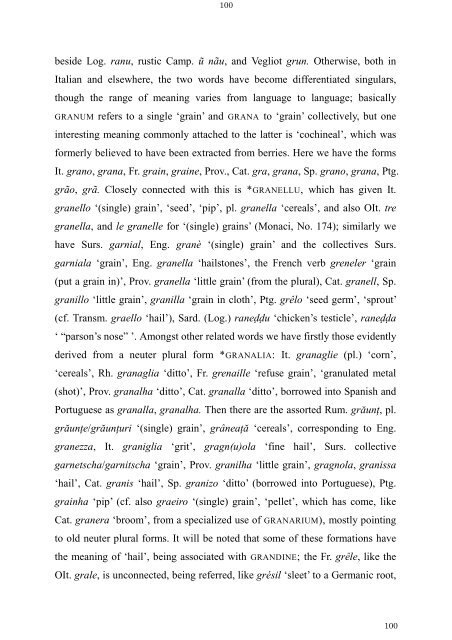The Latin Neuter Plurals in Romance - Page ON
The Latin Neuter Plurals in Romance - Page ON
The Latin Neuter Plurals in Romance - Page ON
You also want an ePaper? Increase the reach of your titles
YUMPU automatically turns print PDFs into web optimized ePapers that Google loves.
100<br />
beside Log. ranu, rustic Camp. ũ nãu, and Vegliot grun. Otherwise, both <strong>in</strong><br />
Italian and elsewhere, the two words have become differentiated s<strong>in</strong>gulars,<br />
though the range of mean<strong>in</strong>g varies from language to language; basically<br />
GRANUM refers to a s<strong>in</strong>gle ‘gra<strong>in</strong>’ and GRANA to ‘gra<strong>in</strong>’ collectively, but one<br />
<strong>in</strong>terest<strong>in</strong>g mean<strong>in</strong>g commonly attached to the latter is ‘coch<strong>in</strong>eal’, which was<br />
formerly believed to have been extracted from berries. Here we have the forms<br />
It. grano, grana, Fr. gra<strong>in</strong>, gra<strong>in</strong>e, Prov., Cat. gra, grana, Sp. grano, grana, Ptg.<br />
grão, grã. Closely connected with this is *GRANELLU, which has given It.<br />
granello ‘(s<strong>in</strong>gle) gra<strong>in</strong>’, ‘seed’, ‘pip’, pl. granella ‘cereals’, and also OIt. tre<br />
granella, and le granelle for ‘(s<strong>in</strong>gle) gra<strong>in</strong>s’ (Monaci, No. 174); similarly we<br />
have Surs. garnial, Eng. granè ‘(s<strong>in</strong>gle) gra<strong>in</strong>’ and the collectives Surs.<br />
garniala ‘gra<strong>in</strong>’, Eng. granella ‘hailstones’, the French verb greneler ‘gra<strong>in</strong><br />
(put a gra<strong>in</strong> <strong>in</strong>)’, Prov. granella ‘little gra<strong>in</strong>’ (from the plural), Cat. granell, Sp.<br />
granillo ‘little gra<strong>in</strong>’, granilla ‘gra<strong>in</strong> <strong>in</strong> cloth’, Ptg. grêlo ‘seed germ’, ‘sprout’<br />
(cf. Transm. graello ‘hail’), Sard. (Log.) raneddu ‘chicken’s testicle’, ranedda<br />
‘ “parson’s nose” ’. Amongst other related words we have firstly those evidently<br />
derived from a neuter plural form *GRANALIA: It. granaglie (pl.) ‘corn’,<br />
‘cereals’, Rh. granaglia ‘ditto’, Fr. grenaille ‘refuse gra<strong>in</strong>’, ‘granulated metal<br />
(shot)’, Prov. granalha ‘ditto’, Cat. granalla ‘ditto’, borrowed <strong>in</strong>to Spanish and<br />
Portuguese as granalla, granalha. <strong>The</strong>n there are the assorted Rum. grăunŃ, pl.<br />
grăunŃe/grăunŃuri ‘(s<strong>in</strong>gle) gra<strong>in</strong>’, grâneaŃă ‘cereals’, correspond<strong>in</strong>g to Eng.<br />
granezza, It. graniglia ‘grit’, gragn(u)ola ‘f<strong>in</strong>e hail’, Surs. collective<br />
garnetscha/garnitscha ‘gra<strong>in</strong>’, Prov. granilha ‘little gra<strong>in</strong>’, gragnola, granissa<br />
‘hail’, Cat. granis ‘hail’, Sp. granizo ‘ditto’ (borrowed <strong>in</strong>to Portuguese), Ptg.<br />
gra<strong>in</strong>ha ‘pip’ (cf. also graeiro ‘(s<strong>in</strong>gle) gra<strong>in</strong>’, ‘pellet’, which has come, like<br />
Cat. granera ‘broom’, from a specialized use of GRANARIUM), mostly po<strong>in</strong>t<strong>in</strong>g<br />
to old neuter plural forms. It will be noted that some of these formations have<br />
the mean<strong>in</strong>g of ‘hail’, be<strong>in</strong>g associated with GRANDINE; the Fr. grêle, like the<br />
OIt. grale, is unconnected, be<strong>in</strong>g referred, like grésil ‘sleet’ to a Germanic root,<br />
100









